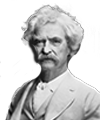Mark Twain The Innocents Abroad
|
| updated |
Copy Link Code
|
 Mark Twain's Innocents Abroad, his first book, which was published in 1869 by The American Publishing Company is a collection of travel stories. The basis for the book, also called The New Pilgrim's Progress, was Twain's journey aboard a chartered vessel named Quaker City. Twain called this trip his "Great Pleasure Excursion" wherein he traveled with a group of Americans through the Holy Land and Europe. The book is actually a compilation and modification of several humorous columns that Twain sent back to the Philadelphia Press, a newspaper for which he worked at the time.
Mark Twain's Innocents Abroad, his first book, which was published in 1869 by The American Publishing Company is a collection of travel stories. The basis for the book, also called The New Pilgrim's Progress, was Twain's journey aboard a chartered vessel named Quaker City. Twain called this trip his "Great Pleasure Excursion" wherein he traveled with a group of Americans through the Holy Land and Europe. The book is actually a compilation and modification of several humorous columns that Twain sent back to the Philadelphia Press, a newspaper for which he worked at the time.
By all accounts, Innocents Abroad is truly a travel book, based on an actual trip full of actual events that occurred on an old retired Civil War ship, the USS Quaker City. The trip was originally sold as a Holy Land excursion with stops along the Mediterranean Sea and a train trip to Paris for the Paris Exhibition of 1867. It also included another trip to the Black Sea and Odessa before going on to the Holy Land.
As the trip progressed, Mark Twain critiqued the various cultures and societies he encountered. His observations were sometimes witty and humorous, but became more sarcastic and sour the closer he got to the Holy Land. The major subject of his criticisms was the conflict between his own travel experience and those grand and exaggerated travel accounts found in conventional travelogues that are designed for use by tourists in a given region. Twain also wrote in a lighthearted manner about his traveling companions and the people he found living in the various regions the tour group visited, along with his own expectations and eventual reactions to the things he actually saw and experienced.
Some quotations that prove Twain's accounts are:
- "In Paris they just simply opened their eyes and stared when we spoke to them in French! We never did succeed in making those idiots understand their own language."
- "As far as I can see, Italy, for fifteen hundred years, has turned all her energies, all her finances, and all her industry to the building up of a vast array of wonderful church edifices, and starving half her citizens to accomplish it. She is today one vast museum of magnificence and misery."
- "Mark Twain, cynical about so much else, has a particular reverence in the Holy Land for "sitting where a god has stood". What flabbergasted him was that his traveling companions would be in such a sanctified environment and winter what they saw according to other writers or their denominational background instead their own experience with the holy." (Note: He writes of himself as if a narrator is observing.)
- "But the cruelest habit the modern prophecy-savans have, is that one of coolly and arbitrarily fitting the prophetic shirt on to the wrong man. They do it without regard to rhyme or reason."
- "Travel is fatal to prejudice, bigotry, and narrow-mindedness, and many of our people need it sorely on these accounts. Broad, wholesome, charitable views of men and things cannot be acquired by vegetating in one little corner of the earth all one's lifetime."
Mark Twain's Innocents Abroad was the best-selling book by this author while he was living, and remains one of the best travel books ever written.
